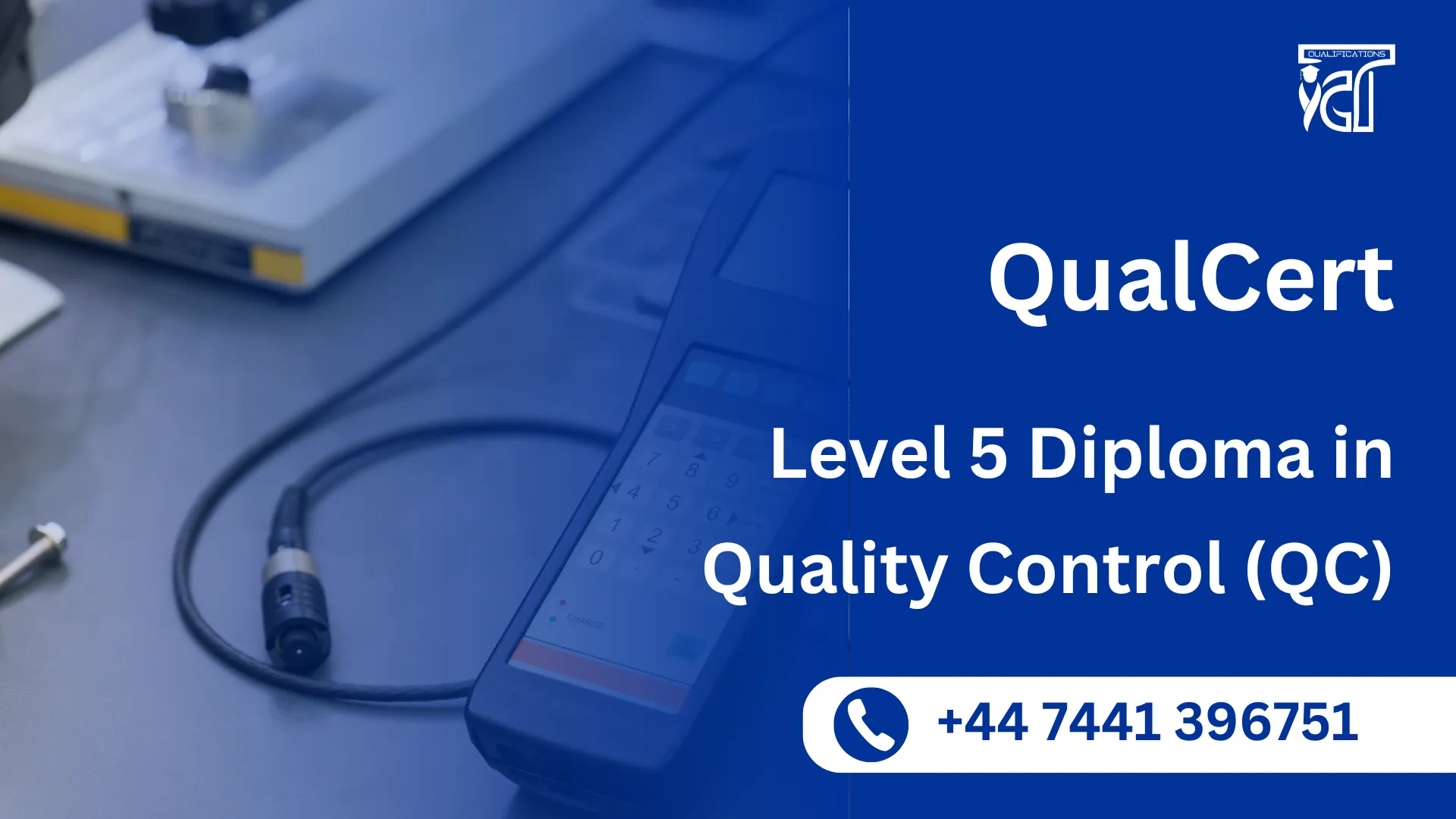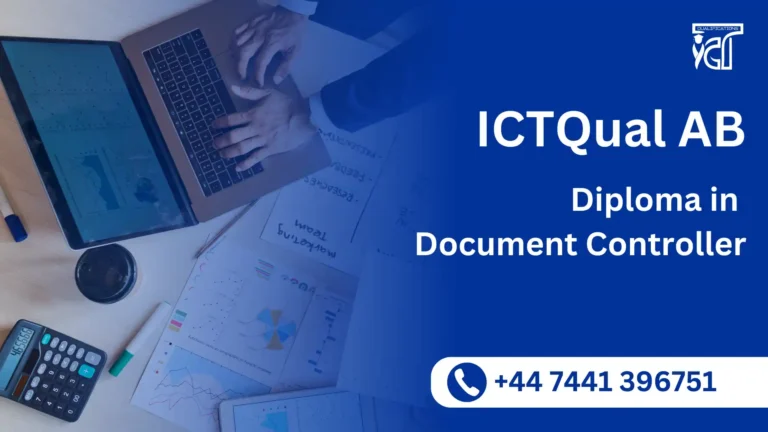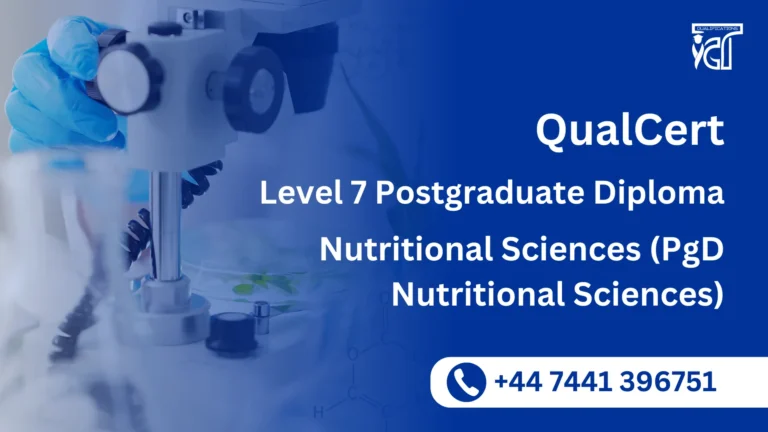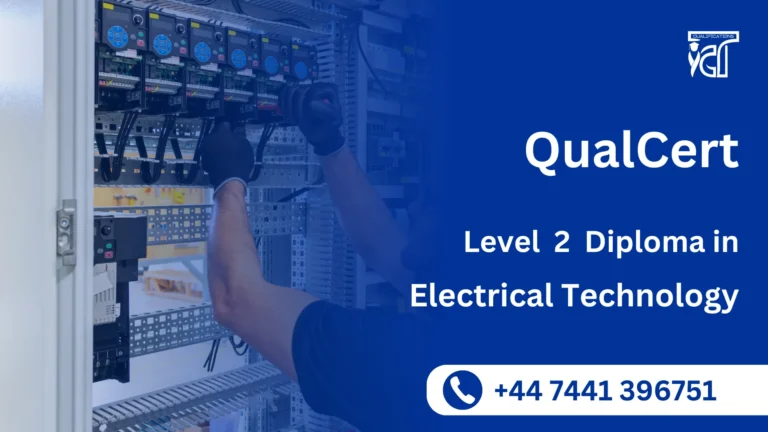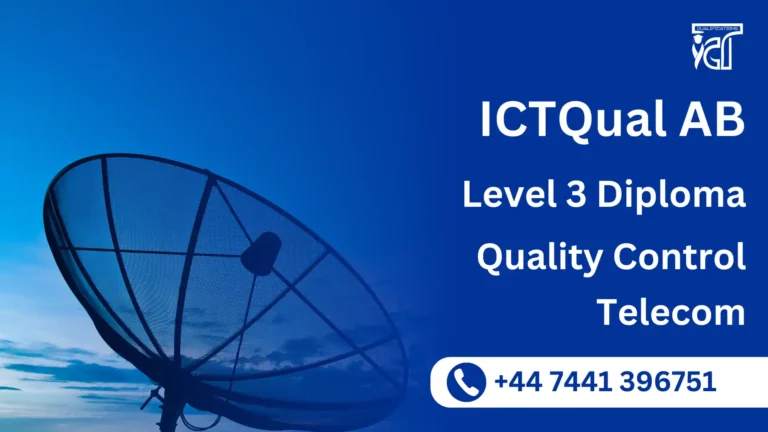In today’s quality-driven industries, maintaining consistent standards in production, service, and operations is a competitive necessity. The role of Quality Control (QC) professionals has become increasingly important as organizations strive to ensure compliance, reduce waste, and improve customer satisfaction. The QualCert Level 5 Diploma in Quality Control (QC) offers a robust, Ofqual-regulated qualification that equips learners with essential knowledge and practical skills to manage and lead quality processes effectively.
This diploma is ideal for professionals seeking to solidify their foundation in quality assurance while preparing for more senior or technical roles in manufacturing, engineering, logistics, and service-based industries.
The QualCert Level 5 Diploma in Quality Control provides learners with the competencies required to implement and monitor quality systems, conduct inspections, manage non-conformance, and support continuous improvement. Designed with industry standards in mind, this fully assignment-based course offers a flexible and practical learning experience suitable for working professionals.
Whether you’re an entry-level quality technician, a team leader, or a production supervisor, this qualification helps you understand and apply quality tools and methodologies across a range of sectors.
The QualCert Level 5 Diploma in Quality Control (QC) is an ideal qualification for professionals seeking to build or enhance their career in quality assurance. With its practical, industry-relevant approach and international recognition, this diploma enables you to take confident steps toward quality excellence, better job opportunities, and professional growth.
Enrol now to take control of your quality career and become a trusted leader in organizational improvement and compliance.
QualCert Level 5 Diploma in Quality Control (QC)
This QualCert Level 5 Diploma in Quality Control (QC) course offers 60 Credits, requiring a Total Qualification Time (TQT) of 600 hours, including 300 Guided Learning Hours (GLH). It is designed for efficient and focused skill development in Quality Control (QC).
| Unit Ref# | Unit Title | Credit | GLH | TQT |
| QC01011 – 1 | Leadership in Quality Management | 10 | 50 | 100 |
| QC01011 – 2 | Advanced Risk Management and Mitigation | 10 | 50 | 100 |
| QC01011 – 3 | Quality Control in Road and Bridge Engineering | 10 | 50 | 100 |
| QC01011 – 4 | Innovations in Construction Material Testing | 10 | 50 | 100 |
| QC01011 – 5 | Project Management for QC Professionals | 10 | 50 | 100 |
| QC01011 – 6 | Sustainability and Environmental Standards in QC | 10 | 50 | 100 |
GLH (Guided Learning Hours) and TQT (Total Qualification Time) are terms commonly used in vocational qualifications to help define the amount of time a learner is expected to spend on their studies.
1. GLH (Guided Learning Hours)
GLH refers to the number of hours a learner spends being directly taught, supervised, or supported during their course. This includes the time spent in activities such as:
- Classroom instruction
- Practical workshops
- One-on-one tutoring or mentoring sessions
- Online learning sessions with tutor support
In other words, GLH represents the time that learners are actively engaged with their instructors or learning activities.
2. TQT (Total Qualification Time)
TQT represents the total amount of time a learner is expected to invest in completing a qualification, including:
- GLH (Guided Learning Hours): Time spent on direct learning, as explained above.
- Self-Directed Learning: This includes time spent on independent study, research, assignment completion, preparation for exams, and any other work the learner does outside of direct teaching hours.
TQT is a broader measure that includes all the time required to achieve the qualification. It helps learners and employers understand the overall commitment required for the qualification.
Key Differences Between GLH and TQT:
- GLH focuses on direct learning with guidance or supervision.
- TQT includes GLH as well as independent study time and other learning-related activities.
Example:
If a qualification has a TQT of 600 hours and a GLH of 250 hours, it means the learner should spend 250 hours in direct learning (classroom, online, or tutor-led sessions) and 350 hours on independent study or research.
Upon successful completion of the Level 5 Diploma in Quality Control, students will be able to:
- Leadership in Quality Management
- Develop leadership skills tailored to managing quality teams and processes.
- Understand how to drive organizational change towards a culture of quality.
- Master techniques to motivate and empower teams to meet quality objectives.
- Enhance decision-making capabilities in high-pressure quality-related situations.
- Implement strategic quality management practices that align with organizational goals.
- Advanced Risk Management and Mitigation
- Identify and assess various risks in quality control processes across industries.
- Apply advanced risk assessment tools to prevent and mitigate potential quality failures.
- Design and implement risk management plans specific to quality assurance needs.
- Understand the impact of risk on quality and make data-driven decisions to minimize it.
- Gain proficiency in using risk mitigation strategies to ensure compliance with regulatory standards.
- Quality Control in Road and Bridge Engineering
- Understand the specific quality control requirements and challenges in road and bridge construction.
- Learn how to apply quality control measures to ensure the integrity and safety of infrastructure projects.
- Utilize relevant quality control tools and techniques specific to civil engineering projects.
- Develop skills to manage and assess quality at various stages of construction projects.
- Gain the ability to collaborate with engineers and construction teams to maintain high quality in infrastructure works.
- Innovations in Construction Material Testing
- Explore emerging technologies and methods in the testing of construction materials.
- Gain an understanding of the latest innovations in materials science and testing techniques.
- Learn to implement cutting-edge testing procedures to ensure the strength and durability of construction materials.
- Analyze and interpret data from innovative material testing methods to enhance quality control.
- Apply knowledge of material innovations to improve the overall quality and safety of construction projects.
- Project Management for QC Professionals
- Understand the principles of project management in the context of quality control projects.
- Develop skills in planning, executing, and monitoring quality-related projects.
- Learn how to manage timelines, resources, and budgets in QC projects effectively.
- Implement project management techniques to ensure that quality objectives are met within the defined scope.
- Gain the ability to lead cross-functional teams in complex quality control initiatives.
- Sustainability and Environmental Standards in QC
- Learn about environmental regulations and sustainability standards relevant to quality control.
- Understand the role of sustainability in quality management practices across industries.
- Develop strategies to implement sustainable practices in quality control processes.
- Assess and manage environmental impacts during the production and delivery of goods or services.
- Ensure compliance with global environmental standards while maintaining high-quality performance in operations.
Benefits of the QualCert Level 5 Diploma in Quality Control (QC)
The QualCert Level 5 Diploma in Quality Control (QC) is a valuable qualification for professionals aiming to build or advance a career in quality assurance and compliance. With its Ofqual-regulated status and practical learning structure, the course offers numerous advantages that align with both industry expectations and personal career goals.
1. Ofqual-Regulated and Internationally Recognized
This diploma is officially regulated by Ofqual, ensuring that it meets high educational standards. The qualification is recognized both in the UK and globally, adding significant value to your CV.
2. 100% Assignment-Based – No Exams
All assessments are based on assignments rather than exams, making this course ideal for professionals who prefer hands-on learning and real-world applications. This also allows learners to apply theory directly to their current job roles.
3. Flexible Online Learning
Study anytime, from anywhere, with full tutor support. This flexible format allows you to balance your studies with work or other commitments, making it an excellent choice for working professionals or part-time learners.
4. Practical, Job-Ready Skills
The course is designed to equip you with actionable skills in inspection, compliance, non-conformance handling, and quality documentation—everything you need to succeed in a real QC environment.
5. Improved Career Prospects
Upon completion, you’ll be prepared for roles such as:
- Quality Control Technician
- QC Analyst
- Production Quality Supervisor
- Compliance Coordinator
This qualification enhances your eligibility for promotions and new job opportunities in multiple industries.
6. Industry-Relevant Curriculum
You’ll gain knowledge that applies directly to sectors like manufacturing, engineering, food and beverage, pharmaceuticals, and logistics, ensuring wide applicability of your qualification.
7. Foundation for Advanced Study
The Level 5 Diploma serves as a strong stepping stone to more advanced qualifications, including:
- Level 6 or 7 Diplomas in Quality Control
- Lean Six Sigma Certifications
- ISO 9001:2015 Auditor Training
This progression supports lifelong learning and long-term career growth.
8. Enhances Problem-Solving and Analytical Thinking
The course trains you in root cause analysis and quality improvement tools, helping you become a key player in reducing errors, increasing efficiency, and improving product or service quality.
9. Strengthens Leadership and Communication Skills
With units focusing on team leadership in QC, you’ll learn how to effectively manage quality teams, communicate with stakeholders, and support organizational goals.
By completing the QualCert Level 5 Diploma in Quality Control (QC), you gain both the credentials and the confidence to succeed in quality-driven roles across a wide range of industries. It’s not just a qualification—it’s a career-enhancing investment.
The Level 5 Diploma in Quality Control (QC) is designed for professionals and individuals looking to advance their expertise and career in the field of quality control. This course is particularly suited for:
1. Experienced Quality Control Professionals
- Quality Control Technicians and Inspectors: Individuals currently working in quality control roles who want to deepen their knowledge and skills to take on more advanced responsibilities.
- Quality Assurance Officers: QA professionals aiming to broaden their understanding of QC methodologies and move into more strategic and managerial roles.
2. Mid-Level Managers and Supervisors
- Production and Operations Managers: Managers overseeing manufacturing or production processes who need to implement and maintain advanced quality control systems.
- Team Leaders and Supervisors: Supervisors responsible for ensuring their teams adhere to high quality standards and protocols.
3. Industry Professionals
- Manufacturing Sector Employees: Individuals working in manufacturing industries where maintaining high quality standards is crucial for product integrity and customer satisfaction.
- Pharmaceutical and Healthcare Professionals: Those in sectors where strict quality standards are mandatory to ensure safety, efficacy, and regulatory compliance.
- Food and Beverage Industry Workers: Quality control personnel in the food industry who need to ensure products meet health and safety standards.
4. Entrepreneurs and Business Owners
- Small Business Owners: Entrepreneurs running small to medium-sized enterprises who want to implement robust quality control measures to improve product quality and customer satisfaction.
- Start-Up Founders: Individuals in start-ups, especially in production or manufacturing, who need advanced knowledge in quality control to build their business on solid quality principles.
5. Regulatory and Compliance Personnel
- Compliance Officers: Professionals responsible for ensuring their organizations comply with industry regulations and standards.
- Regulatory Affairs Specialists: Individuals tasked with navigating and implementing regulatory requirements related to quality control.
6. Continuous Improvement Enthusiasts
- Lean and Six Sigma Practitioners: Individuals trained in Lean and Six Sigma methodologies who want to expand their knowledge in quality control to enhance process improvement initiatives.
- Continuous Improvement Managers: Professionals dedicated to fostering a culture of continuous improvement within their organizations.
7. Academic and Training Institutions
- Educators and Trainers: Individuals teaching quality control courses who seek formal qualifications to enhance their teaching credentials.
8. Career Switchers
- Professionals from Related Fields: Individuals from related fields such as engineering, production, or operations who wish to transition into quality control and need advanced training and certification.
Entry Requirements
Register Now
Qualification Process
Qualification Process for the QualCert Level 5 Diploma in Quality Control (QC)
- Self-Assessment:
Begin by evaluating your eligibility to ensure you meet the qualification requirements, including work experience, knowledge, and language proficiency. - Registration:
Complete your registration by submitting the required documents, including a scanned copy of a valid ID, and paying the registration fee. - Induction:
An assessor will conduct an induction to confirm your eligibility for the course and explain the evidence requirements. If you do not meet the criteria, your registration will be canceled, and the fee will be refunded. - Assignmnets & Evidence Submission:
Provide all assignmnets and the necessary evidence based on the assessment criteria outlined in the course. If you are unsure of the required evidence, consult with the assessor for guidance on the type and nature of evidence needed. - Feedback and Revision:
The assessor will review your submitted evidence and provide feedback. Evidence that meets the criteria will be marked as “Criteria Met,” while any gaps will be identified. You will be asked to revise and resubmit if needed. - Competence Evidence:
Submit final evidence demonstrating that all learning outcomes have been met. This evidence will be marked as “Criteria Met” by the assessor once it is satisfactory. - Internal Quality Assurance (IQA):
The Internal Quality Assurance Verifier (IQA) will review your evidence to ensure consistency, quality, and compliance with standards. - External Verification:
The IQA will submit your portfolio to QualCert External Quality Assurance Verifiers (EQA) for final confirmation. The EQA may contact you directly to verify the authenticity of your evidence. - Certification:
Upon successful completion of all checks, QualCert will issue your official certificate, confirming that you have attained the QualCert Level 5 Diploma in Quality Control (QC).

